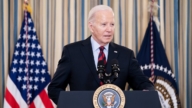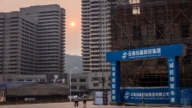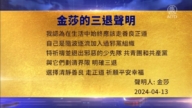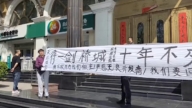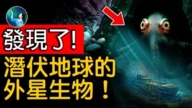【新唐人2011年8月20日讯】北京的新锐时政刊物《长城月报》杂志,总编朱顺忠17号被公安找上,威胁要查封杂志社。此前一天,广州《南风窗》杂志社长陈中因所谓“把关不力、政治导向错误”被免职。一些媒体人认为,中共为了延长统治不得不加强舆论管制,但封杀新闻自由是逆潮流而动,必然失败。
北京《长城月报》杂志总编朱顺忠17号在微博发布求助消息说:今天上午,几个自称福绥镜派出所民警突然出现在单位,语气强硬要求办公室人员立即找到本人。否则查封《长城月报》。
过去最新一期的《长城月报》,对中国红十字会丑闻、上访者被关精神病院等尖锐议题进行了探讨,评论文章更直指制度缺失。《长城月报》长期以来为民主法治,报导不少重大事件,惹怒不少官员。
无独有偶,《广州日报》集团旗下杂志《南风窗》,社长陈中因“把关不力、政治导向错误”,16号被免职。导火线是,杂志刊发赵灵敏关于民国历史的访谈文章《狭隘民族主义与外交政策》,令宣传主管部门不满。
对此,中国资深新闻工作者高瑜表示,中共统治大陆62年彻底失败,目前把维稳当成了第一任务,所以封杀一切不符合他需要的信息。
高瑜:“这是一个信号,《南风窗》登了这样文章,和中共口径对社会上不一致的,我先给你一个下马威,把你社长免了,告诉下边必须按照中宣部的做,如果有越雷池一步,也就是《南风窗》社长的下场。”
高瑜认为,《南风窗》和《长城月报》事件表明,中共现在更加加强对舆论的管制。前一段动车事件的很多内幕,特别是关于铁道部的腐败、高铁大跃进的问题,以及涉及到的技术和管理问题,也都被宣传部门硬生生的压住了。
高瑜说,从封网、杀网、金盾工程,到现在的删微薄,中共这种治理方式是在抗衡信息化,包括箝制学术自由和思想自由,但最后,只能搬起石头砸自己的脚,注定失败。
高瑜:“邓小平时代封杀报纸,现在是留着杂志,把人给换了。谁不听我话,出了麻烦,我就换人。”邓小平时代,批判谁谁红,到江泽民、胡锦涛时抓谁谁红。”
也从事写作的《纽约时报》特约摄影师杜斌表示,中共内部对当前形势也感到不乐观,所以必须加紧媒体管制。但杜斌认为,这样适得其反。
杜斌:“就是因为打压了,大家都回过头来看一看,到底是什么触动了当局,这样的时候大家会去深思。其实这样的打压,只是让它自己更加难堪。把这个人搞掉了,把那个人搞掉了,搞掉了之后将来还会有,不是这个媒体就是那个媒体。因为现在的潮流,任何逆潮流的东西都不会健康生存下去的。”
已经被停刊的《商务周刊》主编高昱感伤的向《德国之声》表示,十年前的今天,他和资深媒体工作者长平还在跑新闻,那时候大家说《南周》、《新闻周刊》、《三联》和《南风窗》誓将天花板顶出窟窿。如今天花板却越压越低。
不过,杜斌不这么认为,他说,中国的民众还是大有希望的。他确信,那个天花板不仅会被捅出窟窿,甚至有可能整个天花板都能掉下来。
新唐人记者梁欣、宋风、孙宁采访报导。
Chinese Media Suffer
Zhu Shunzhong, chief editor of the Great Wall Monthly,
a new political magazine in Beijing, was harassed by police.
On Aug. 17, the police threatened to shut down his magazine.
On August 16, Chen Zhong, the president of Guangzhou’s
Nan Feng Chuang (NFC) magazine, was dismissed
for being “unable to correctly censor the magazine’s articles
and for taking things in the wrong political direction.”
Some people in the media believe that the
Chinese Communist Party (CCP) tightly controls the media
to maintain its power and destroy freedom of press in China,
which is sure to backfire.
Zhu Shunzhong, chief editor of Great Wall Monthly in Beijing,
appealed for help on micro-blog on August 17:
“This morning, several policemen appeared in my office and
ordered my staff to quickly find me.
Otherwise, they would close down the Great Wall Monthly.”
In the latest issue, the Great Wall Monthly commented on
several sensitive issues like the China Red Cross Scandal,
petitioners being detained in psychiatric hospitals
and directly pointed out faults in CCP’s political system.
The articles irritated many CCP officials for they reported
on issues from the perspective of democracy and rule of law.
Similarly, the president Chen Zhong of the NFC magazine,
which belongs to the Guangzhou Daily Group, was dismissed
on August 16 for being “unable to correctly censor articles and
for taking things in the wrong political direction.”
It all started with an interview article published by
Zhao Lingmin entitled,
“The Narrow Mindedness of Chinese Nationalism and
Diplomacy,” which irritated censorship offices.
Veteran media professional Gao Yu, said that the CCP’s
62 years of rule in China has failed and
it now considers its own stability
as its primary task and censors any information it dislikes.
Gao Yu: “This is a signal. The NFC magazine published
such articles inconsistent with CCP’s propaganda.
Then the CCP intimidated NFC by dismissing its president
and telling others to follow the Central Propaganda Department.
Otherwise, they will meet the same end as their president.”
Gao Yu believes that the NFC the Great Wall Monthly cases
indicate that the CCP has now intensified their media control.
Previously, there were many inside stories floating around
about the high-speed train accident, especially those about the
corruption of the Ministry of Railways,
the Great Leap Forward in railways,
and other technical and management issues.
But these stories have been repressed by censorship offices.
Gao Yu said that by blocking and closing websites,
building the Golden Shield Project, and now deleting blogs,
the CCP is fighting against the informatization trend,
including academic freedom and the freedom of thought.
But their efforts are doomed to fail in the end.
Gao Yu: “In the Deng Xiaoping Era, (the CCP)
put a stop to independent newspapers.
But now they keep the media but change the people in charge.
Anyone who disobeys or makes troubles will be replaced.
In the Deng Era, anyone who was denounced became famous,
while under Jiang Zemin and Hu Jintao,
anyone that was detained would be famous.”
Du Bin, New York Times’ special photographer-writer,
said that the CCP is not very optimistic while facing
the current situation, so they intensify their control of the media.
But Du Bin believes that it will have the exact opposite effect.
Du Bin: “Because someone is repressed, people will look
back to see what exactly irritates the authorities
and they will think about things thoroughly.
Actually this kind of repression is embarrassing to the CCP.
They can kill this person or that person,
but there will be other persons in the future to face;
either this medium or that medium, since anything against
the current information trend won’t last too long.”
Gao Min, chief editor of the Business Watch,
which has been closed, sorrowfully told the Deutsche Welle,
that ten years ago he worked as a news reporter with
Chang Ping, a senior media professional.
At that time, people said that the South Weekend,
the China News Weekly, Life Week, and the NFC,
will set new standards—
but now the ceiling is pressing lower and lower.
But Du Bin doesn’t think so.
He said that Chinese people still have hope.
He believes that the ceiling will not only be broken through,
but it will also probably fall.
NTD reporters Liang Xin, Song Feng and Sun Ning


